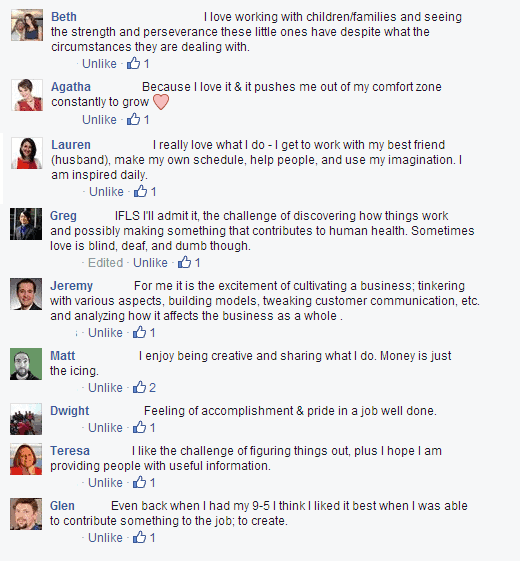There was a stretch of about two months where I was a voracious TED Talk watcher and listener. I started with the top ten most watched TED Talks, which soon became Top 20 (but I haven’t watched all twenty yet), and it became one of the most powerful 100 minutes I ever spent (“Sir Ken Robinson says schools kill creativity” still reverberates in my head as our two pre-school children grow up).
If you have a limited amount of time, I recommend watching the top five. They will challenge the way you think in a positive way and there is a 0% chance you will regret spending a hundred minutes this way.
Today, I want to talk to you about the talk that had the most profound impact on me.
But first…
Table of Contents
Why do you work?
When I posed this question to my friends on Facebook, here’s a small sampling:

Until I watched that TED talk, I never asked myself why I worked.
I worked because that’s what I was supposed to do.
There was no why.
I don’t think about why I breathe air, I just do it. I don’t think about why I go to sleep, I just do it (and looooove it!). I don’t think about why I work, I just do it.
But there is a why and it’s was very important for me to understand it before I could truly put my life in balance.
Start With Why
The TED talk that had a profound (and I don’t use this word lightly) impact on me was a 2009 talk by Simon Sinek. Here’s the 18 minute video, please watch it if you’ve never seen it:
The talk is about businesses but it really applies to people too. Sinek talks about how the truly successful ones understand and start with their Why.
For me to fully come to terms with not working all the time, I have to first understand my Why.
I was running my life by leading with the What and the How. I never led with Why.
Incidentally, Start With Why is the name of Simon Sinek’s first book and it’s a great read. I’ve heard good things about Leaders Eat Last too, but I haven’t read it yet.
Why Do I Work?
On a mid-afternoon walk, I started to think about my Why.
Now, this isn’t a cheesy thing where I show you a photo of my cute little kids and my lovely wife and say I do it all for them. I do, but I always feel like those little disclosures are a little… manufactured. We all do it for our families. We all love our kids and our spouses and we go the extra mile for them.
That’s a given.
But that isn’t what I mean when I think about the Why… I want to go deeper. I need to understand, deep down past the warm and fuzzies, why I’m working.
First, I work for money. I want to and need to be paid. The bank wants money, stores want money, and photos of my kids might elicit an “awwww” but they don’t pay the bills. All things being equal, more is better and I want to be paid more.
I work for that feeling of accomplishment. The feeling that there was a difficult problem in front of me today and I beat it. I pride myself on being able to figure things out, to solve problems, and to work with what I have to accomplish a task. So being able to demonstrate that to myself on a daily basis is very fulfilling.
Finally, I enjoy learning. I think this stems from when I was a child and being rewarded when I knew something other people didn’t. My dad made me study verb tenses (present, past, past participle… I still don’t know what past participle means) from the back of a dictionary, a thick red hardcover Merriam-Webster dictionary, and it was empowering to know things my peers didn’t.
I always need to be learning and growing as a person or I feel stagnant. It’s like exercising. Once you get in the habit of exercising, stopping is very hard.
Being sedentary is difficult because you get a general sense of malaise that you can’t put your finger on.

On Money
When I thought about the top three reasons I work (money, accomplishment, and learning), I glossed over money but went into greater detail for the other two. I wanted to talk about money in greater detail now.
First, we all need money for obvious reasons – food, shelter, entertainment, etc.
We also need money because it represents something very important.
After many years of writing about money on Bargaineering, I learned that with money is never about actual dollars and cents.
Polls (Marist Institute for Public Opinion) have shown that at around $50,000 a year, people aren’t remarkably happier if they earn more. A 2010 Princeton University study put that number at $75,000. In other words, once you get past a certain amount, money stop making you happier at the same rate.
When it comes to money, it’s not the actual number on my paycheck or in my bank account, it’s what it represents.
It represents the world recognizing my value.
This is why you’ll have people who are content with their salary get angry when they discover their office mate, who may be an inferior employee, earns more. It’s not the money, it’s what it represents.
It’s why you might be happy with a 4% raise until you find out the next guy got a 5% raise. It’s not the money, it’s what it represents.
The actual money is important but the recognition of my value is also important.
That said, it’s dangerous to fall into the trap of equating my value to the world with how much I’ve earned.
There are plenty of financial wizard types who bring little to the world but are highly compensated because they found an exploitable weakness in the system.
There are plenty of hucksters and scammers who earn a lot of money peddling their systems and processes to people looking to get rich quick.
So while I don’t tie my self-worth to my net worth, money is certainly a small factor.
Autonomy, Mastery & Purpose
Daniel Pink, author of Drive: The Surprising Truth About What Motivates Us, gave a talk at The Royal Society for the Encouragement of Arts that the RSA animated into this great video:
The relevant part starts at around 5 minutes, when he talks about three factors that lead to better performance and personal satisfaction: Autonomy, Mastery and Purpose.
What’s interesting is that they match up relatively well with the reasons I came up with for why I work.
I have Autonomy because I am my own boss.
Mastery is exactly my desire to constantly be learning and accomplishing things. Getting better at something is part of the learning process.
The last one, Purpose, matches up with money. I work for the money. Pink calls it the Profit Motive and when it gets unmoored from the Purpose Motive, bad things happen.
BAD THINGS!
Now, that’s a little dramatic on an individual basis, since my goal in life isn’t to make money (whereas the primary goal of a business is to generate a profit) but the message is still clear. If my Purpose in my work is to simply make money, that’s not a good Purpose.

Now What?
Good question. 🙂
What is my purpose in life and where does work fit in?
My purpose is to enjoy life, grow and support my awesome family, be a good teacher to our children, a good husband to my lovely wife, and a good son to my parents.
To use a car analogy, I feel as though I’m the engine and the money I earn from working is the gasoline. I need a certain amount to keep going but I don’t need 50 gallons if my tank can only hold 15.
What I need to do is short-circuit the part of my head that thinks I need to stockpile the extra 35 gallons in drums around the house (for those with clever intentions and a liberal interpretation of analogies, there are no piles of money around our house!).
How do I do this? Cars need more than gasoline to operate. If I want to be happy, if I want my family to be happy, if I want to fulfill my purpose, I need to make sure everything else is maintained – family, friends, health, and spirit… as well as work.
How I plan on doing that is for another day…
Now it’s your turn, why do you work?




I think you have to really know yourself to know why you work. I’m personally very much motivated by autonomy and purpose which is why stumbling into self-employment has been a huge blessing (even if it is far more time consuming). I’m a big fan of what I call the “zoom out”- taking a moment to step back from doing and reflecting at least once a week (if not more) to make sure I’m in alignment with my why. I don’t think we give ourselves those reflective opportunities often enough, we forget that we’re evolving and changing all the time.… Read more »
I’m a big fan of zooming out too. I really need to step back and think about what and why I’m doing something, not necessarily always how. When you’re younger, you can always just outwork people because you have the energy and stamina. When you get older, you realize it’s more about working smarter than harder. 🙂
For me, it’s also one of those things I need to schedule in my calendar because when you’re heads down, tunnel visioned into something it’s REALLY HARD to break free.
TED is awesome!
Great post, and something I’ve been thinking about a lot! Like Stefanie, I stumbled into self-employment, and went a little too fast trying to earn more. Money was certainly a motivator, and my “why” was too weak. I’ve slowly been redefining my purpose and figuring out a plan to balance my work so it better aligns with how I want to live. I really liked the car analogy for that reason, as I’ve been guilty of focusing on the numbers while missing the bigger picture. It’s so important to stop and reflect (especially when you’re the boss – no one… Read more »
The transition to self-employment is really really hard on so many different levels and this is one of them. It’s hard to be reflective when you have to work hard at the same time!
How have you been adjusting your approach? How is it different now vs. when you were first self-employed? I’d love to hear your experiences because that’s a really tough transition.
It is tough, especially because it’s hard to know what to expect when you never thought you’d be self-employed. I plan on writing an entire blog post about it when I figure it out. 😉 I’m in the beginning phases of trying to plan and make changes to my business, but by the end of the year, I hope to have a more solid direction.
I can’t wait to see it! 🙂
I listened to a Knowledge for Men episode with Dean Graziosi and he explained the same idea. It was life changing for me! Discovering my why made making decisions easier and created more focus for me. I highly highly recommend finding your why to anyone who hasn’t yet.
I’ll have to take a look at that episode, thanks for sharing it!
Jim,
This is a great question. Like you, I don’t know that I’ve ever asked myself why I work, so this is a great reflection exercise.
I think, when executed properly, work can be extremely rewarding. This, of course, depends on the type of work you do and whether or not it fits your lifestyle.
I never did it until I was prompted and it seems very common. But when you start thinking about it, like really thinking about it, it’s surprising what comes out.
I have to say, I’ve never really given this much thought since changing careers (accounting to advertising) 12 years ago. Probably time to evaluate. It can only help make me more clear in my business goals.
Great thought process here! Beyond all the normal things like making money and providing for my family, I feel like work challenges me. Not only do I have to learn new things but I also have to push myself outside my comfort zone to places I wouldn’t normally go.
The challenges, and overcoming them, can be a huge motivator because that’s how you continually grow, right? Having a productive environment to challenge and push yourself is extremely important for a lot of folks.
Great post, Jim! And you’re right. Simply earning more “because” isn’t enough of a why for me. I had the ability to earn incentive based bonuses at my last job and I never found it that motivating. But the ability to be creative has always fueled me. And in the future, I’m certain helping people will by my why.
It’s so awesome you’ve realized that so early in your career too. I remember years ago, sitting in interviews, where someone would ask me why I wanted to work at the company. My answer was always “I enjoy creating things, I enjoy writing code and seeing it build something on the screen that did something productive.” At the time, my answer was one of those “eh, this sounds good” because in my heart I thought “I want to get paid.” It wouldn’t be years later that I realized I enjoy solving interesting problems and seeing what I’m capable of doing…… Read more »
The behavioral science presented in the video is incredibly convincing. However, unlike the presenter, I have a tough time believing that most for profit institutions can create those “purpose fulfilling” jobs. One of my goals as an employee is to be an “intrapreneur”, taking my company to the top by the virtue of my ideas. This mindset has been rewarding both and has come with great financial perks. However, after five years of a rewarding career, it’s tough for me to get behind my company’s purpose which isn’t exactly my purpose, and even autonomy and mastery and money aren’t enough.… Read more »
Awesome post Jim! Love this concept. For me, the why I work is very specific. I’m concerned with IMPACT. Reaching and influencing as many people as possible – be it by giving them new thoughts, or challenging their assumptions is what motivates me.
I think that this most closely ties in with the “accomplishment” reason you list here.
Thanks for the article!
Thanks Scott!
You’re working with a great team over there at BP, I have no doubt you’ll have a huge impact.
Like other commenters, I think this is a great piece because it makes you think. Too many of us settle into a routine of getting up, battling traffic, and punching our time cards. My response is a little bit different from many others because I work in corporate America. To me, I think I stay with my company because I like the idea of being part of a team. As an only child with a small family, I like the idea of having a community to bounce my ideas off of, and a group to share successes and failures with.… Read more »
That was what I missed about the corporate world, that camaraderie is hard to replace when you work for yourself. While I miss it, I knew that it wasn’t something I absolutely needed to have and so I was OK saying good bye. I was part of a fantastic team, we worked well together, and I miss them but…. 🙂